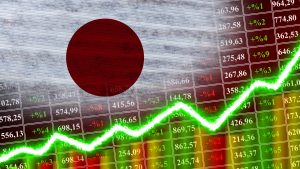Recently two seemingly paradoxical headlines about the Japanese economy caught people’s attention. First, in 2023 Japan’s GDP was surpassed by that of Germany. Japan thus dropped to the world’s fourth-largest economy, 13 years after its long hold on the number two position was overtaken by China in 2010. And yet the Japanese stock market has continued to roar and even hit a historical record, with the Nikkei Index once climbing above 40,000. This was even higher than its peak in 1989, right before the bubble burst.
These two headlines taking place at the same time might be puzzling. Is the Japanese economy in good shape or bad? How should people understand these contradictory phenomena?
To be fair, it should be mentioned that the nominal GDP is influenced by the exchange rate. Given that the Japanese yen has depreciated against the U.S. dollar by nearly 30 percent in the past decade, its GDP calculation would certainly shrink.
That said, it doesn’t necessarily mean that Japan’s economy is secretly doing better than Germany’s. Data from the IMF shows that Japan’s average real growth rate annually from 2000 to 2022 was only 0.7 percent, while that of Germany was 1.2 percent. As a result, during the past two decades, Japanese GDP only rose about 10 percent, while German GDP nearly doubled.
Meanwhile, Japan’s labor productivity – measured by the worth of goods or services a worker can produce per hour – ranked 30th among the 38 OECD countries as of 2022, and the lowest among the advanced G-7 countries. Japan’s labor productivity is just 60 percent of Germany’s, which ranks second, only behind the United States. This is why Germany’s GDP can catch up with Japan’s, despite having a population that is only two-thirds of Japan’s.
There are more worrying indicators for the Japanese economy. Japan’s nominal GDP per capita stood at $34,064 in 2022, ranking 21st among the 38 members of the OECD – a record-low for Japan. Furthermore, Japan’s GDP accounted for only 4.2 percent of the world economy as of 2022, which is also the lowest percentage on record since the 1980s. In the last quarter of 2023, private consumption and business investment respectively dropped by 0.4 percent and 0.1 percent compared with the previous quarter.
With such a severe economic situation, why is the stock market soaring?
The major reason is that many big Japanese companies are doing well thanks to the weak yen. Companies such as Toyota benefit significantly from the depreciation of the yen; these firms are setting records for profits and market value.
Another big reason for the booming stock market is the rising investment from overseas. Investors like Warren Buffett continue to pump money into the Japanese stock market, as the return is good. Domestically the Japanese government is also encouraging people to invest with the new NISA policy.
Does the stock hike suggest a prosperous economy in today’s Japan? The answer is a loud no.
The weak yen is a double-edged sword. It does bring huge profits for export-oriented companies, but also makes import-oriented companies, which rely heavily on foreign energy, food, and materials, suffer greatly. Big companies might be winning the game, but most of the small and medium-sized enterprises (SMEs) are not.
The biggest predicament facing Japan’s economy at the moment is the slump in consumption. And that is mainly because ordinary workers’ wages have almost remained at the same level during the past three decades. This is abnormal for an advanced economy. Although big companies have raised wages for employees in response to the government’s request, most SMEs are reluctant to do so.
Due to the Bank of Japan’s continuous financial deregulation, the Japanese economy has gradually reversed from deflation to inflation in recent years. Commodity prices are rising sharply. However, ordinary people’s salary raises aren’t keeping pace.
The inflation rate in this year is expected to be around 3 percent, while newly released data showed that real wages in January 2024 fell 0.6 percent year on year. This trend would not only hold back individual consumption, but also lead to the loss of human resources. There are reports that many skilled Japanese workers are moving to the United States and Europe, as they can receive much higher salaries there while doing similar jobs.
The stock market has been gradually pushed to new highs by Abenomics during the past decade. Prime Minister Kishida Fumio’s economic policy has basically inherited Abenomics. Although the Kishida administration has worked out its action plan of “new capitalism” to focus on both growth and redistribution of wealth, there are few signs that the underlying problems will be solved anytime soon.
































